
Mediation in Georgia
In the state of Georgia, mediation is a powerful tool for resolving conflict even in the most complex cases. As a method of finding a resolution that suits everyone involved, mediation is not about winning or losing. It’s about focusing on cooperation rather than conflict, bridging the gap between two parties so they can come to an agreement on their own, rather than leaving it to the whims of a judge or jury.
In working together to resolve differences, everyone involved experiences far less emotional stress while avoiding the expensive legal fees of a prolonged trial. Mediation also allows for customized solutions that suit the unique needs of both sides, granting you greater flexibility than the legal process while still enforcing a structured sense of fairness. The outcomes you reach together in mediation are as legally enforceable as any judge’s ruling, which is why the state of Georgia often requires mediation prior to official court dates or trials.
The Two Types of Mediation – Pro Se (without attorneys) Versus Represented Mediation (with attorneys)
There’s no such thing as one-size-fits-all mediation, but in Georgia, you’ll typically encounter two types: Pro Se Mediation, where both parties negotiate directly with each other under the guidance of a neutral mediator; and Represented Mediation, where each party hires an attorney to assist in negotiations, provide legal advice, and help draft and evaluate settlement terms.
Pro Se (Without Attorneys) Family Law Example:
In a family law case, two parents who are separating may disagree about a parenting schedule for their children. Rather than going through a costly and time-consuming court process, they could choose Pro Se mediation. With the help of a neutral mediator, they work together to create a parenting plan that fits their family’s needs, saving time, reducing conflict, and avoiding the high expenses of litigation.
Pro Se (Without Attorneys) Civil Case Example:
In a civil case, a driver who accidentally damages a neighbor’s property may have a dispute with the homeowner over the cost of repairs. Instead of going through a lengthy court battle, both sides could agree to Pro Se mediation. With the help of a neutral mediator, they can discuss the situation, share information, and work toward a fair resolution, saving both time and legal expenses compared to a traditional trial.
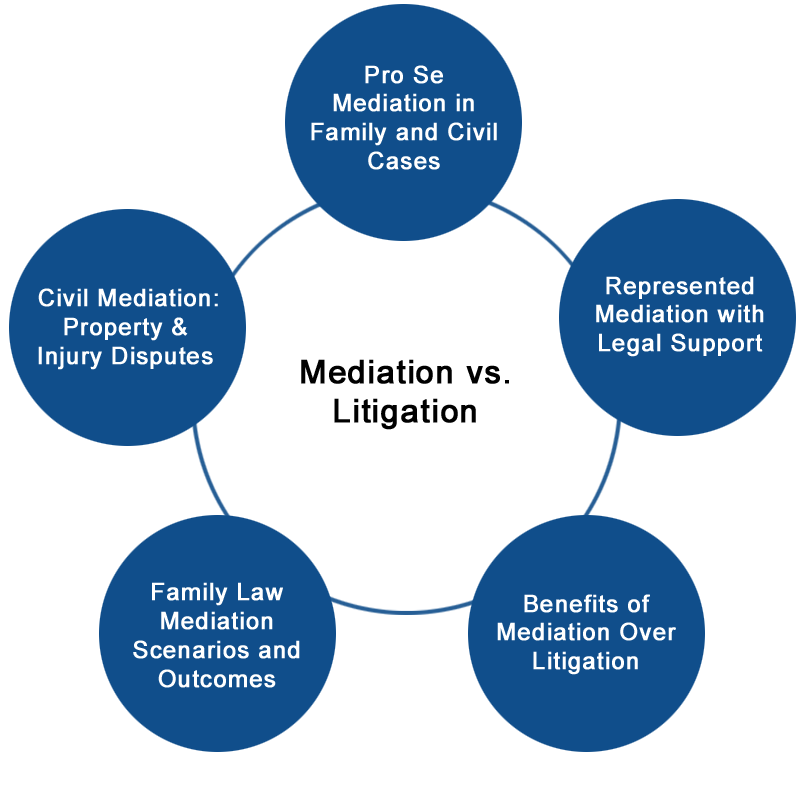 Represented Mediation (With Attorneys)
Represented Mediation (With Attorneys)
Represented mediation is far more common and is used in everything from family law to civil disputes. In this type of mediation, both sides participate not alone with a neutral mediator, but with their attorneys by their side. Having attorneys involved is often more effective, as they serve as communicators and negotiators between their clients and the mediator. These attorneys understand the law and how to use it strategically to protect and advance their client’s interests.
Represented Family Law Mediation Example:
For example, two parents working through the details of a divorce can each hire their own attorney and a mediator to help them reach agreements on everything from custody to parenting time. This approach keeps everyone out of the courtroom and off the public record, meaning not everyone in town will know your personal information. With the legal protection of an attorney, the parents can find a fair, enforceable, and legally valid agreement that supports both parties and protects the well-being of the children.
Civil Law Mediation Example:
In civil disputes, such as when someone has been injured in a car accident and experienced medical malpractice, both sides can attend mediation with their attorneys instead of going to trial. Together, they work toward a fair and reasonable resolution that includes appropriate compensation.
As a seasoned trial attorney and certified mediator, William R. Claiborne offers clients the best of both worlds: skilled legal defense and strategic conflict resolution. Having worked on both sides of the table, he brings a deeper understanding of how to anticipate the opposing side’s approach, navigate sensitive negotiations, and reach favorable outcomes more efficiently. With over 20 years of experience, his legal insight and mediation expertise provide a powerful advantage in resolving complex legal matters. At the Claiborne Firm, our mission is to protect you, ease the stress of your pending legal matter, and deliver the best possible outcome.
Types of Cases We Mediate Across Georgia
Mediation is useful in a variety of cases, and The Claiborne Firm proudly offers mediation to save time and money on all types of matters. While many mediations can be handled entirely online for greater ease and convenience, in-person mediation may be required by the courts. Either way, you will be protected every step of the way.
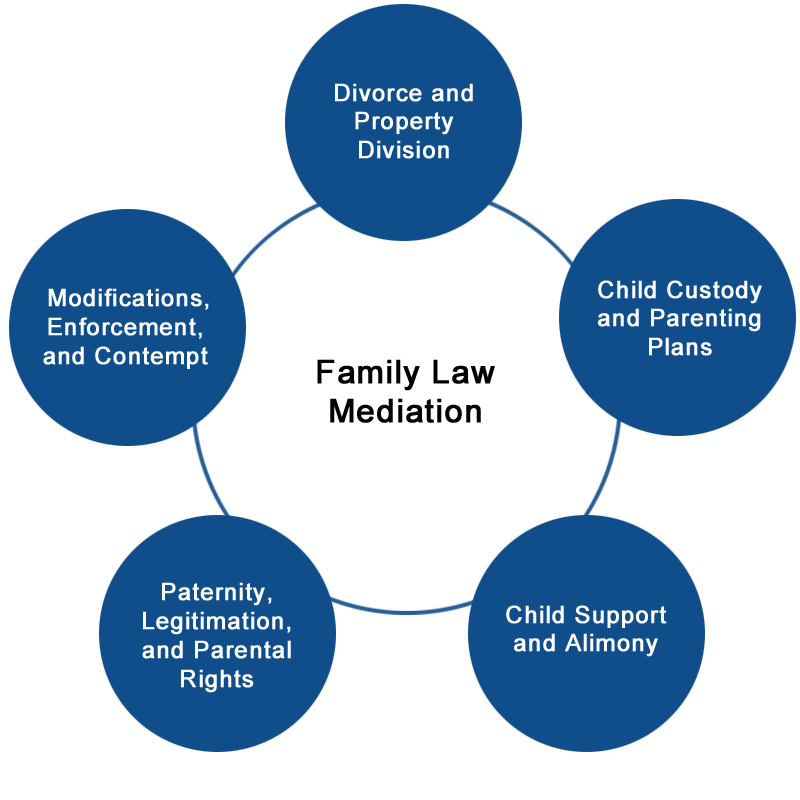 Family Law Mediation
Family Law Mediation
In Georgia, many family law matters are either required or strongly encouraged to go through mediation before heading to trial. Common family law issues resolved through mediation include:
- • Contested divorce
- • Child custody disputes
- • Parenting time and visitation rights
- • Child support
- • Alimony (spousal support)
- • Creation or modification of parenting plans
- • Paternity disputes
- • Legitimation actions
- • Modification of custody, support, or visitation orders
- • Relocation or move-away cases
- • Enforcement of court orders
- • Contempt actions related to support or custody violations
- • Division of marital property and debts
- • Disagreements over medical or educational decision-making for children
Civil Cases Commonly Referred to Mediation
The court often refers many civil cases to mediation, including the following types of personal injury claims:
- • Car accidents
- • Truck accidents
- • Motorcycle accidents
- • Pedestrian accidents
- • Bicycle accidents
- • Rideshare (Uber/Lyft) accidents
- • Boating accidents
- • Slip and fall injuries
- • Trip and fall injuries
- • Dog bites and animal attacks
- • Workplace injuries (non-workers’ compensation)
- • Construction site accidents
- • Negligent security
- • Premises liability
- • Wrongful death claims
- • Burn injuries
- • Spinal cord injuries
- • Traumatic brain injuries (TBI)
- • Product liability
- • Medical malpractice
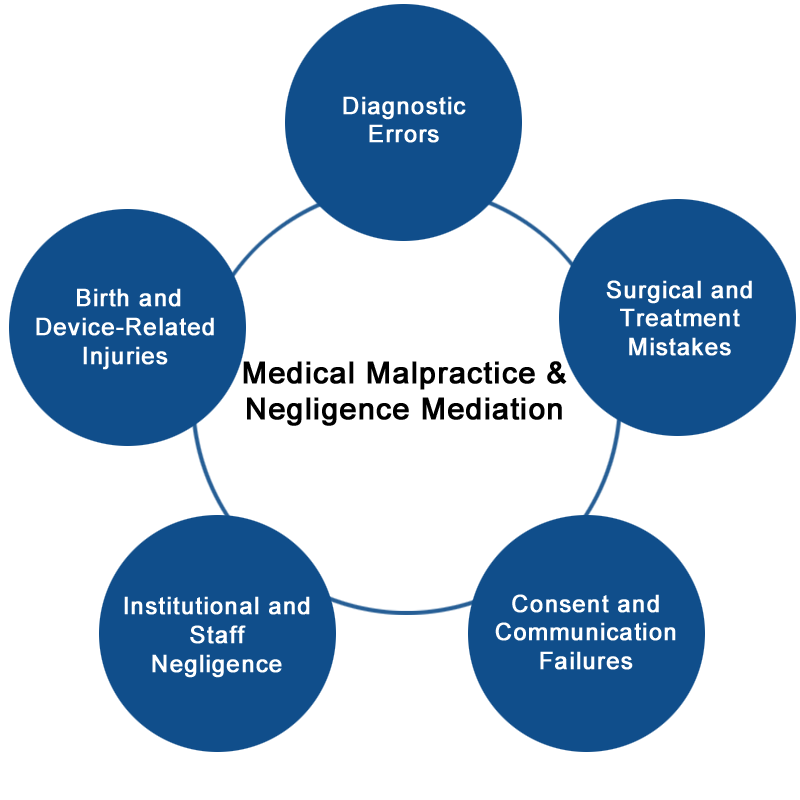 Medical Malpractice and Negligence Cases Often Starting with Mediation
Medical Malpractice and Negligence Cases Often Starting with Mediation
These cases may begin with mediation before trial:
- • Misdiagnosis
- • Delayed diagnosis
- • Surgical errors
- • Anesthesia errors
- • Medication errors
- • Birth injuries
- • Failure to treat
- • Lack of informed consent
- • Hospital negligence
- • Emergency room mistakes
- • Nursing home negligence
- • Radiology errors
- • Lab errors
- • Medical device failures
- • Psychiatric malpractice
The Benefits of Mediation
Mediation Saves Your Money
There are a myriad of benefits to mediation. First and foremost, it saves you money. In some cases, these savings can add up to hundreds of thousands or even millions of dollars, because litigation is a much more expensive process. You’re not just spending money on an attorney when you take a case to trial – you’re spending your precious time on the complexity of it all – filing motions, attending hearings, going over documents, waiting in court. Your attorney is spending their time on them as well, racking up enormous fees as they do. And that’s on top of fees you’ll pay for court reporters, discovery costs, administrative fees and witness fees, any of which can be multiplied if a case is appealed or delayed.
With mediation, the speed at which issues are resolved saves you on attorney’s fees. Most of the work will be done by the mediator, whose hourly fee is typically split between both parties.
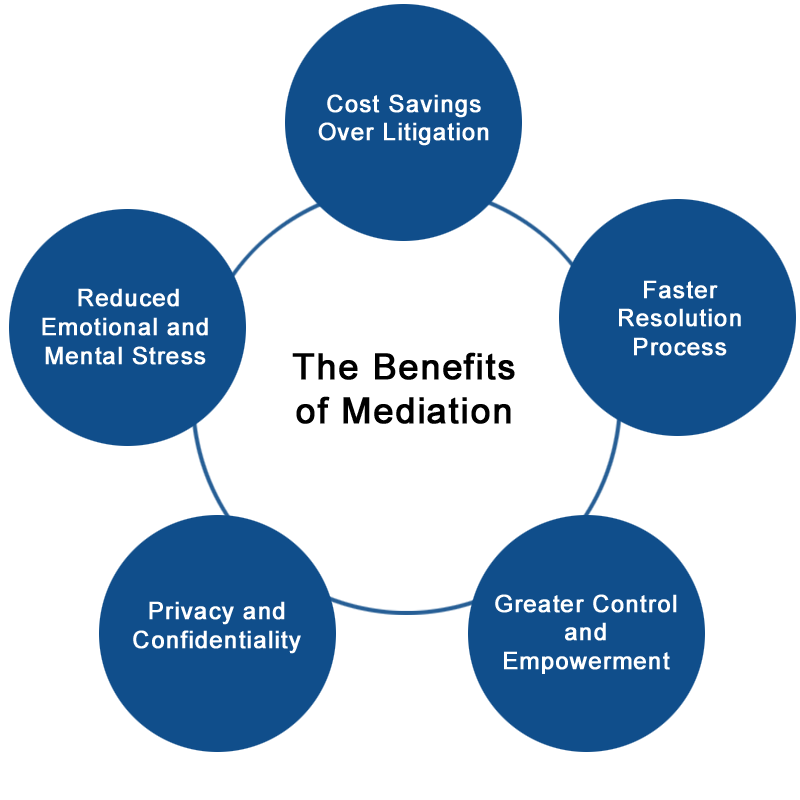 Mediation Saves You Time
Mediation Saves You Time
That speed is another of mediation’s many benefits. Courts are typically backlogged, with judges staring down hundreds of cases on their dockets that can take months or even a year to advance to a hearing. And even if you do get a court date, that date can be delayed by procedural issues, scheduling complications or another trial taking priority. Once the trial begins, the formal procedures can get bogged down in motions, responses, pre-trial conferences and filings, furthering the delay before a judge can issue a ruling.
Mediation cuts through all that red tape, simplifying the entire process down to a handful of meetings that allow both parties to quickly come together to reach a resolution.
Mediation Empowers You to Shape the Outcome
Another massive benefit of mediation is the power it gives to those involved. Rather than leave their fate in the hands of a judge or jury, both parties get to have a strong guiding hand in their fate. No judge or jury can understand the situation better than those directly involved, and mediation puts them in the driver’s seat. Through mediation, both sides are able to say their piece, come to an agreement with dignity, and reach a mutual decision that works best for their family, finances and future.
Mediation Protects Your Privacy
Finally, one tremendous advantage of mediation is its privacy. In court, everything said becomes a matter of public record, from financial disclosures to allegations and testimony. This can be devastating, especially when the disagreement involves sensitive issues regarding your family or business. Because everything said during mediation is private, there’s little chance of embarrassing or awkward information becoming public, allowing both sides to speak openly and honestly.
Contrast this with the emotional and financial toll of a court trial. Dealing with the stress of an unpredictable trial, the exhausting litany of depositions and meetings that erode your personal time, the emotional vulnerability it places you in to see your personal affairs made public, the months spent in limbo while waiting for a decision, and the pain of living with a decision you don’t agree with.
Essentially, mediation is more affordable, fast, private and advantageous to all involved than litigation. This is why the state of Georgia often requires mediation to occur before a trial in most family law and civil matters. This is also why most cases are settled in mediation before they even go to court – in fact, very few civil cases actually make it to trial.
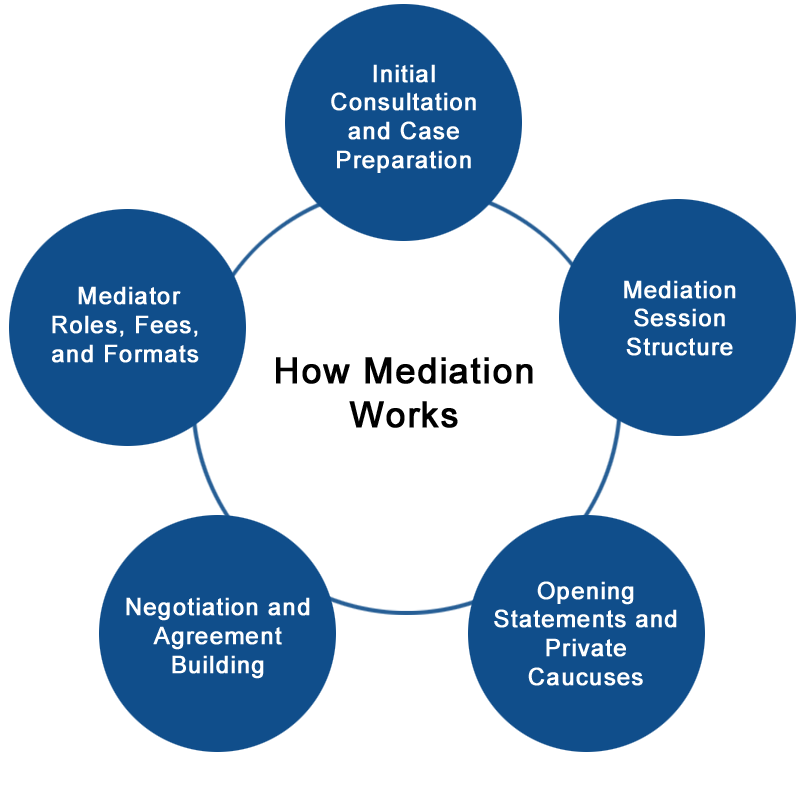 How Mediation Works
How Mediation Works
Most courts will require at least one mediation session before a case can go to trial, especially in cases involving family law or civil law. These sessions generally last from 1-3 hours, although some can last an entire day. In simple cases, one session may be all that it takes. But more complex cases can stretch across several sessions or even months until the issue is resolved.
At the start of the session, which can be held at a mediation center, law center, or over the web or Zoom, each party or their attorney will give their opening statements. This part generally lets both sides present their side of the story, and illustrate the outcome they’d like to see. From there, the mediator will speak privately with each party in a caucus to help them understand the issues and concerns better, and work with them to build solutions. From there, the mediator will negotiate with both sides to arrive at mutually agreeable terms and build a working compromise. Once that compromise has been reached, both parties agree to have the terms written up, signed and filed with the court.
And throughout the entire process, you enjoy greater financial control. The mediator will be paid either on an hourly basis or as a predetermined retainer. Their fees vary based on whether the mediation was ordered by the court or not, whether the mediator is a certified mediator or attorney-mediator, and whether it is a Pro Se or Represented mediation.
At The Claiborne Firm, we view mediation as a powerful tool in conflict resolution, and one that should be treated with honesty and transparency from the start. That’s why we charge a flat $450 initial consultation fee for every new case, followed by a custom retainer that gives you only the representation you need and nothing you don’t.
During this initial consultation, Mr. Claiborne and his paralegal will give you their legal counsel, listen to your concerns, ask questions to understand your case better, review whatever evidence you may have, and begin outlining a strategy to secure you the best outcome. This private and confidential meeting will guide the next steps, let you understand exactly what costs you can expect, and help us prepare. Because preparation is key to The Claiborne Firm’s track record of success – taking the time to understand your situation, your desired outcome and every detail of the case that could help us in mediation.
With that established, we walk into mediation with a firm understanding of your case and a robust strategy to achieve your goals. And as our record shows, that preparation helps us protect clients and secure the absolute best possible outcome. Call us today to schedule your private consultation with The Claiborne Firm so we can get started resolving your dispute, fighting for your rights and walking with you every step to the outcome you deserve.
Areas Serviced:
Abbeville, GA
Acworth, GA
Adairsville, GA
Adel, GA
Adrian, GA
Ailey, GA
Alamo, GA
Alapaha, GA
Albany, GA
Aldora, GA
Allenhurst, GA
Allentown, GA
Alma, GA
Alpharetta, GA
Alston, GA
Alto, GA
Ambrose, GA
Americus, GA
Andersonville, GA
Arabi, GA
Aragon, GA
Arcade, GA
Argyle, GA
Arlington, GA
Arnoldsville, GA
Ashburn, GA
Athens, GA
Atlanta, GA
Attapulgus, GA
Auburn, GA
Augusta, GA
Austell, GA
Avalon, GA
Avera, GA
Avondale Estates, GA
Baconton, GA
Bainbridge, GA
Baldwin, GA
Ball Ground, GA
Barnesville, GA
Bartow, GA
Barwick, GA
Baxley, GA
Bellville, GA
Berkeley Lake, GA
Berlin, GA
Bethlehem, GA
Between, GA
Bishop, GA
Blackshear, GA
Blairsville, GA
Blakely, GA
Bloomingdale, GA
Blue Ridge, GA
Bluffton, GA
Blythe, GA
Bogart, GA
Boston, GA
Bostwick, GA
Bowdon, GA
Bowersville, GA
Bowman, GA
Braselton, GA
Braswell, GA
Bremen, GA
Brinson, GA
Bronwood, GA
Brookhaven, GA
Brooklet, GA
Brooks, GA
Broxton, GA
Brunswick, GA
Buchanan, GA
Buckhead, GA
Buena Vista, GA
Buford, GA
Butler, GA
Byromville, GA
Byron, GA
Cadwell, GA
Cairo, GA
Calhoun, GA
Camak, GA
Camilla, GA
Canon, GA
Canton, GA
Carl, GA
Carlton, GA
Carnesville, GA
Carrollton, GA
Cartersville, GA
Cave Spring, GA
Cecil, GA
Cedartown, GA
Centerville, GA
Centralhatchee, GA
Chamblee, GA
Chatsworth, GA
Chattahoochee Hills, GA
Chauncey, GA
Chester, GA
Chickamauga, GA
Clarkesville, GA
Clarkston, GA
Claxton, GA
Clayton, GA
Clermont, GA
Cleveland, GA
Climax, GA
Cobbtown, GA
Cochran, GA
Cohutta, GA
Colbert, GA
College Park, GA
Collins, GA
Colquitt, GA
Columbus, GA
Comer, GA
Commerce, GA
Concord, GA
Conyers, GA
Coolidge, GA
Cordele, GA
Cornelia, GA
Covington, GA
Crawford, GA
Crawfordville, GA
Culloden, GA
Cumming, GA
Cusseta, GA
Cuthbert, GA
Dacula, GA
Dahlonega, GA
Daisy, GA
Dallas, GA
Dalton, GA
Damascus, GA
Danielsville, GA
Danville, GA
Darien, GA
Dasher, GA
Davisboro, GA
Dawson, GA
Dawsonville, GA
Dearing, GA
Decatur, GA
Deepstep, GA
Demorest, GA
Denton, GA
De Soto, GA
Dexter, GA
Dillard, GA
Doerun, GA
Donalsonville, GA
Dooling, GA
Doraville, GA
Douglas, GA
Douglasville, GA
Dublin, GA
Dudley, GA
Duluth, GA
Dunwoody, GA
Du Pont, GA
East Dublin, GA
East Ellijay, GA
Eastman, GA
East Point, GA
Eatonton, GA
Echols County, GA
Edge Hill, GA
Edison, GA
Elberton, GA
Ellaville, GA
Ellenton, GA
Ellijay, GA
Emerson, GA
Enigma, GA
Ephesus, GA
Eton, GA
Euharlee, GA
Fairburn, GA
Fairmount, GA
Fargo, GA
Fayetteville, GA
Fitzgerald, GA
Flemington, GA
Flovilla, GA
Flowery Branch, GA
Folkston, GA
Forest Park, GA
Forsyth, GA
Fort Gaines, GA
Fort Oglethorpe, GA
Fort Valley, GA
Franklin, GA
Franklin Springs, GA
Funston, GA
Gainesville, GA
Garden City, GA
Garfield, GA
Gay, GA
Geneva, GA
Georgetown, GA
Gibson, GA
Gillsville, GA
Girard, GA
Glennville, GA
Glenwood, GA
Good Hope, GA
Gordon, GA
Graham, GA
Grantville, GA
Gray, GA
Grayson, GA
Greensboro, GA
Greenville, GA
Griffin, GA
Grovetown, GA
Gumbranch, GA
Guyton, GA
Hagan, GA
Hahira, GA
Hamilton, GA
Hampton, GA
Hapeville, GA
Haralson, GA
Harlem, GA
Harrison, GA
Hartwell, GA
Hawkinsville, GA
Hazlehurst, GA
Helen, GA
Hephzibah, GA
Hiawassee, GA
Higgston, GA
Hiltonia, GA
Hinesville, GA
Hiram, GA
Hoboken, GA
Hogansville, GA
Holly Springs, GA
Homeland, GA
Homer, GA
Homerville, GA
Hoschton, GA
Hull, GA
Ideal, GA
Ila, GA
Iron City, GA
Irwinton, GA
Ivey, GA
Jackson, GA
Jacksonville, GA
Jakin, GA
Jasper, GA
Jefferson, GA
Jeffersonville, GA
Jenkinsburg, GA
Jersey, GA
Jesup, GA
Johns Creek, GA
Jonesboro, GA
Junction City, GA
Kennesaw, GA
Keysville, GA
Kingsland, GA
Kingston, GA
Kite, GA
LaFayette, GA
LaGrange, GA
Lake City, GA
Lakeland, GA
Lake Park, GA
Lavonia, GA
Lawrenceville, GA
Leary, GA
Leesburg, GA
Lenox, GA
Leslie, GA
Lexington, GA
Lilburn, GA
Lilly, GA
Lincolnton, GA
Lithonia, GA
Locust Grove, GA
Loganville, GA
Lone Oak, GA
Lookout Mountain, GA
Louisville, GA
Lovejoy, GA
Ludowici, GA
Lula, GA
Lumber City, GA
Lumpkin, GA
Luthersville, GA
Lyerly, GA
Lyons, GA
McCaysville, GA
McDonough, GA
McIntyre, GA
Macon, GA
McRae–Helena, GA
Madison, GA
Manassas, GA
Manchester, GA
Mansfield, GA
Marietta, GA
Marshallville, GA
Martin, GA
Maxeys, GA
Maysville, GA
Meansville, GA
Meigs, GA
Menlo, GA
Metter, GA
Midville, GA
Midway, GA
Milan, GA
Milledgeville, GA
Millen, GA
Milner, GA
Milton, GA
Mitchell, GA
Molena, GA
Monroe, GA
Montezuma, GA
Monticello, GA
Montrose, GA
Moreland, GA
Morgan, GA
Morganton, GA
Morrow, GA
Morven, GA
Moultrie, GA
Mountain City, GA
Mountain Park, GA
Mount Airy, GA
Mount Vernon, GA
Mount Zion, GA
Nahunta, GA
Nashville, GA
Nelson, GA
Newborn, GA
Newington, GA
Newnan, GA
Newton, GA
Nicholls, GA
Nicholson, GA
Norcross, GA
Norman Park, GA
North High Shoals, GA
Norwood, GA
Nunez, GA
Oak Park, GA
Oakwood, GA
Ochlocknee, GA
Ocilla, GA
Oconee, GA
Odum, GA
Offerman, GA
Oglethorpe, GA
Oliver, GA
Omega, GA
Orchard Hill, GA
Oxford, GA
Palmetto, GA
Parrott, GA
Patterson, GA
Pavo, GA
Peachtree City, GA
Peachtree Corners, GA
Pearson, GA
Pelham, GA
Pembroke, GA
Pendergrass, GA
Perry, GA
Pinehurst, GA
Pine Lake, GA
Pine Mountain, GA
Pineview, GA
Pitts, GA
Plains, GA
Plainville, GA
Pooler, GA
Portal, GA
Porterdale, GA
Port Wentworth, GA
Poulan, GA
Powder Springs, GA
Pulaski, GA
Quitman, GA
Ranger, GA
Ray City, GA
Rayle, GA
Rebecca, GA
Register, GA
Reidsville, GA
Remerton, GA
Rentz, GA
Resaca, GA
Rest Haven, GA
Reynolds, GA
Rhine, GA
Riceboro, GA
Richland, GA
Richmond Hill, GA
Riddleville, GA
Rincon, GA
Ringgold, GA
Riverdale, GA
Roberta, GA
Rochelle, GA
Rockmart, GA
Rocky Ford, GA
Rome, GA
Roopville, GA
Rossville, GA
Roswell, GA
Royston, GA
Rutledge, GA
St. Marys, GA
Sale City, GA
Sandersville, GA
Sandy Springs, GA
Santa Claus, GA
Sardis, GA
Sasser, GA
Savannah, GA
Scotland, GA
Screven, GA
Senoia, GA
Shady Dale, GA
Sharon, GA
Sharpsburg, GA
Shellman, GA
Shiloh, GA
Siloam, GA
Sky Valley, GA
Smithville, GA
Smyrna, GA
Snellville, GA
Social Circle, GA
Soperton, GA
South Fulton, GA
Sparks, GA
Sparta, GA
Springfield, GA
Stapleton, GA
Statesboro, GA
Statham, GA
Stillmore, GA
Stockbridge, GA
Stone Mountain, GA
Stonecrest, GA
Sugar Hill, GA
Summertown, GA
Summerville, GA
Sumner, GA
Sunny Side, GA
Surrency, GA
Suwanee, GA
Swainsboro, GA
Sycamore, GA
Sylvania, GA
Sylvester, GA
Talbotton, GA
Talking Rock, GA
Tallapoosa, GA
Tallulah Falls, GA
Talmo, GA
Tarrytown, GA
Taylorsville, GA
Temple, GA
Tennille, GA
Thomaston, GA
Thomasville, GA
Thomson, GA
Thunderbolt, GA
Tifton, GA
Tiger, GA
Tignall, GA
Toccoa, GA
Toomsboro, GA
Trenton, GA
Trion, GA
Tucker, GA
Tunnel Hill, GA
Turin, GA
Twin City, GA
Tybee Island, GA
Tyrone, GA
Ty Ty, GA
Unadilla, GA
Union City, GA
Union Point, GA
Uvalda, GA
Valdosta, GA
Varnell, GA
Vernonburg, GA
Vidette, GA
Vienna, GA
Vidalia, GA
Villa Rica, GA
Waco, GA
Wadley, GA
Waleska, GA
Walnut Grove, GA
Walthourville, GA
Warm Springs, GA
Warner Robins, GA
Warrenton, GA
Warwick, GA
Washington, GA
Watkinsville, GA
Waverly Hall, GA
Waycross, GA
Waynesboro, GA
Webster County, GA
West Point, GA
Whigham, GA
White, GA
White Plains, GA
Whitesburg, GA
Willacoochee, GA
Williamson, GA
Winder, GA
Winterville, GA
Woodbine, GA
Woodbury, GA
Woodland, GA
Woodstock, GA
Woodville, GA
Woolsey, GA
Wrens, GA
Wrightsville, GA
Yatesville, GA
Young Harris, GA
Zebulon, GA
Call (912) 351-8775 or Schedule a Free Case Evaluation Online
